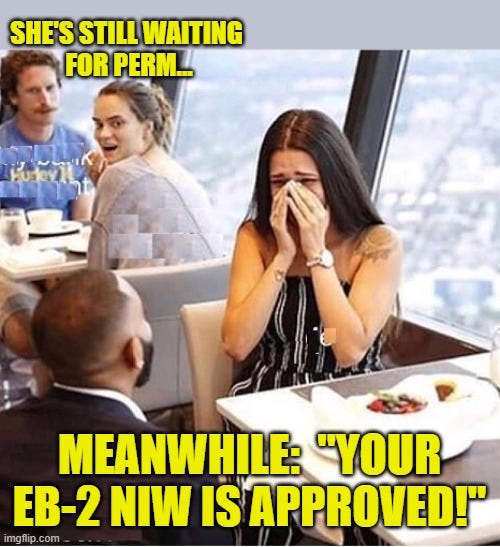EB-2 NIW Case Study: Non-STEM NGO and Sustainability Professional approved without RFE
This post provides a short case study/case summary of a successful EB-2 NIW case we handled for a candidate with a Bachelor's in Business + Political Science, and a Master's in Teaching.
There are limited ways for professionals to self-petition for U.S. permanent resident (green card) status. Perhaps the easiest way to self-petition for a green card is via EB-2 NIW, which requires meeting the standards of an administrative law case called Matter of Dhanasar.
I have previously written several posts about EB-2 NIW. If you are new to all this, I would encourage you to consider reviewing these posts:
EB-2 NIW is a category that can be well-suited for STEM (Science, Technology, Engineering, Math) graduates and as noted in one of the above-linked articles, the Biden Administration has issued official policy guidance to promote EB-2 NIW as an option for STEM graduates.
But it is important to remember that EB-2 NIW does NOT require a STEM degree. Recently we were successful in a case where the candidate did not have a STEM degree.
Background Facts
Candidate was from Asia, in the United States in F-1 visa status.
Candidate had a Bachelor’s degree in Business and Political Science, and Master’s degree in Teaching/Curriculum.
Candidate had work experience from abroad in communications and NGO/non-profit policy development.
Evidence
The candidate in this case did not have what I would call ‘traditional’ peer-reviewed articles, or a Google Scholar profile demonstrating citations to peer-reviewed articles.
The candidate had no patents or other intellectual property, or other formal academic research that is often associated with EB-2 NIW cases or EB-1(A) and EB-1(B) cases.
But the candidate here had participated in publishing a white paper/technical report and had been active in a variety of ‘public-facing’ activities to be impactful in her area of interest.
The candidate engaged in media, promoting issues and expanding awareness of areas where she has subject matter expertise.
The candidate was very active and engaged in her case. She spent a lot of time looking for professional opportunities to build her profile. She did this over several months.
The candidate was (and is) interested in positively influencing water resources management policy and had relevant work experience in the United States and abroad. Her proposed endeavor articulated her interest in water resources management and the importance of such work to the United States.
Anyone trying to understand how USCIS officers analyze EB-2 NIW cases should review Matter of Dhanasar, linked above, and also the USCIS Policy Manual regarding Advanced Degree Professionals.
One of the relatively obscure provisions of the Policy Manual related to EB-2 NIW discusses the potential impact of evidence from a government or quasi-government entity. This does NOT mean only letters from the U.S. government or U.S. government agencies; it could also be state agencies or other groups aligned with policy goals of the United States.
The USCIS Policy Manual states:
3. The Role of Interested Government Agencies or Quasi-Governmental Entities
While not required, letters from interested government agencies or quasi-governmental entities in the United States (for example federally-funded research and development centers) can be helpful evidence and, depending on the contents of the letters, can be relevant to all three prongs….
Detailed letters of government or quasi-governmental interest that provide relevant information about how well-positioned the person is to advance the endeavor are valuable for purposes of assessing the second prong.[75] Finally, an interested government agency or quasi-governmental entity can help explain how granting the waiver may outweigh the benefits of the job offer and labor certification requirement by explaining a particular urgency or detailing how the United States would benefit from the prospective noncitizen’s contributions, even if other U.S. workers are available.
Source here.
The evidence in this case included copies of articles and papers and other activities of the candidate, along with 3 letters of recommendation from people familiar with her work in the field.
As noted above, this particular candidate has been very active and her activity spanned arguably a wide range of interests so part of our work as her law firm was to help focus the case and showcase the evidence relevant to get her case approved.
Sometimes clients are so eager to get their case approved that they provide information and evidence that is too disparate. A strong EB-2 NIW case, in my view, has a ‘flow’. There is a narrative to the case.
In terms of timing, this EB-2 NIW I-140 case was filed in December 2022 via regular processing, then converted to premium processing. The premium processing request arrived at USCIS on March 6, 2023, and then the EB-2 NIW I-140 was approved just 3 days later on March 9, 2023.
It is true the candidate is still waiting for her priority date to be current, as of the date of this writing on April 29, 2023, but she has the peace of mind to have an approved I-140 with a self-petition so she can change employers or positions without having to worry about starting over. She is in the waiting game but she is on track to getting her green card to live and work in the United States indefinitely.




